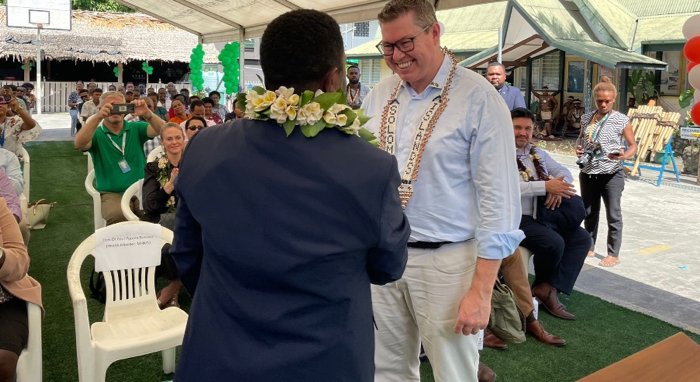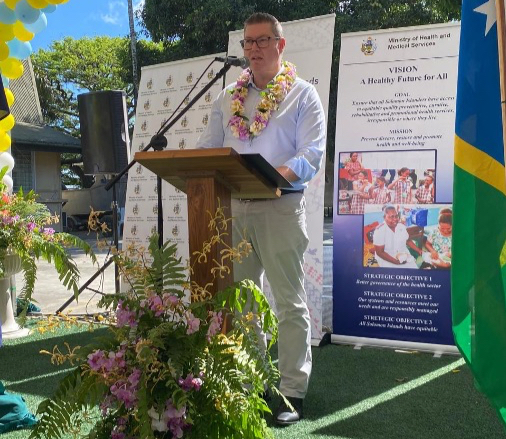Australia continues to boost the country’s health sector with the announcement of 20 existing and new health partnership deals.
Australia’s Minister for International Development and the Pacific Pat Conroy MP, joined by Minister for Health and Medical Services Paul Popora Bosawai made the announcement today where Australia is boosting its support for Solomon Islands’ national health priorities through more than 20 new and continuing partnerships.
Through the Partnerships for a ‘Healthy Region initiative,’ Australian organisations will work with the Ministry of Health and Medical Services, National Referral Hospital, civil society organisations and regional and multilateral partners to respond to key health priorities including health worker skills, infectious disease response, and preventing non-communicable diseases such as cervical cancer.
The new activities under the Solomon Islands-Australia Partnership were announced at an event in Honiara today, Thursday 19th September.

Minister of Health and Medical Services Dr Paul Bosawai said, “I seize the opportunity to make special mention of the lead role played by Australian Government, and particularly DFAT, in generating this initiative.
“The Ministry of Health will continue to collaborate with our collaborating partners under this Regional Initiative in their effort not only to planned objectives and deliverables but also the added value and resource that this initiative will bring.
“As a beneficiary to this new programme and initiative, it is my hope that this initiative will not only provide an opportunity for all of us but hopefully the initiatives are matched with meaningful and tangible resources for implementation that will make a difference to the improvement of health services in the country,” said Hon. Dr Paul Bosawai.
Australia will fund over 20 new activities through its Partnerships for a ‘Healthy Region initiative,’ which is supporting Solomon Islands – and other countries across the Pacific and Southeast Asia – to build resilient, equitable and inclusive health systems, that can address current and future challenges, such as the health impacts of climate change.
The package includes continuation of existing activities in Solomon Islands, such as support for the Ministry of Health’s medical supply chain management, and training field epidemiologists to identify and track disease outbreaks.

The package targets some of the most pressing health issues in Solomon Islands, with new partnerships to help Solomon Islands eliminate cervical cancer—the second most common cause of cancer-related deaths in Solomon Islands—and introduce local interventions against rheumatic heart disease.
“The people of Solomon Islands are its greatest asset, and investing in people is an investment in the future of this great country,” Minister Conroy said.
“Australia’s assistance under this substantial new package reflects our steadfast commitment to the health and wellbeing of Solomon Islanders and our whole Pacific family.”
Australia will also work with the Ministry of Health and communities to reduce the spread of communicable diseases like malaria and dengue, as well as reduce the risk of transmission of animal diseases to humans.
This includes a new partnership with Australian Red Cross to train village volunteers to improve community monitoring of disease outbreaks.
Under the initiative, Australia is also supporting Solomon Islands to build the health workforce it needs for the future, with targeted clinical training for health workers like nurses and midwives, and for emergency and acute care.
Minister Conroy said Australia and Solomon Islands have a deep and enduring connection.
“Across our partnership, we are delivering tangible, long-lasting benefits for the community and government of Solomon Islands, now and for generations to come, and this new package extends and deepens our support,” Minister Conroy said.
“This comprehensive package of support for health in Solomon Islands reflects Australia’s commitment to working with Solomon Islands to respond to local priorities with local solutions, and ensuring services are available and accessible to all who need them.”
- AHC










